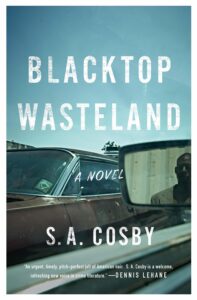S. A. Cosby, Blacktop Wasteland (2020)
Review by Lee Horsley

Blacktop Wasteland, S. A. Cosby’s wonderful debut novel, is in a class with the very best of hard-boiled noir writing. Unfailingly gripping, it is written in vivid prose that’s both tough and lyrical. Even in the most bone-crunchingly brutal scenes of this high-octane heist novel, action is imbued with emotional force and dark humour. No matter how fast we’re moving, we simultaneously experience the protagonist’s thoughts and feelings:
“He pushed the van up to 65 and aimed it at the ramp. He felt it then. Felt it for the first time tonight. The high, the juice, the symbiotic relationship between man and machine. The thrumming vibrations that worked their way up from the blacktop through the wheels and suspension system like blood moving through veins until it reached his hands. The engine spoke to him in the language of horsepower and RPMs. It told him it yearned to run.”

Cosby’s novel is a searching, highly individual character study that is at the same time a wider reflection on the adversity faced by African Americans living in the Southern states. Interviewed by the LA Times, Cosby, who is from Southeastern Virginia, talks about the external tensions created by “prejudice in all directions”. Urbanites, he suggests, often assume fellow African Americans living in the South must be more submissive and compliant: “And so you’ve got Black people looking at you with disdain. You’ve already got white people looking at you like that. There’s a certain mental toughness that it takes to live in the cradle of the Confederacy.”
In the same interview, Cosby laments the shortage of strong Black Southern characters in crime fiction – of characters able to “stand on their own two feet and create their own destiny.” Blacktop Wasteland admirably helps to remedy this shortage, amply demonstrating Cosby’s ability to create nuanced and complex characters. His protagonist, Beauregard ‘Bug’ Montage, has great warmth and vitality, together with an acute awareness of the need to struggle with his divided nature. His superlative skills as a driver and mechanic are inherited from his father, Ant, whose criminal activities forced him to go on the run when his son was still a teenager. Now grown up, Beauregard is determined to put crime behind him, to be a better family man than his father, and when the novel opens he is struggling to support his wife and children by running a down-on-its-luck car repair business. But as financial pressures overwhelm him, he feels irresistible pressure to return to the Life. Will he be able to repay his debts by again becoming a wheelman, or will he, in doing so, risk losing the family he wants to protect?
“You know, I used to think of myself as two people. Sometimes I was Bug and sometimes I was Beauregard. Beauregard had a wife and children. He ran a business and went to school plays. Bug . . . well, Bug, he robbed banks and armored cars. He drove 100 miles per hour on hairpin curves. Bug threw the people who killed his cousin in a car crusher. I tried to keep them apart, Beauregard and Bug. But my Daddy was right. You can’t be two types of beasts.”
The action of the novel is propelled by hardship and kept in motion by betrayals, violent revenges, sudden losses and reversals. His father, who has never returned, is both a hero to him and a stark warning of what can happen to a man who gets drawn into the world of crime and vengeance. When he rides around in Ant Montage’s old car, the Duster, Beauregard tries to tell himself that it doesn’t matter that the man he loved was really a gangster and a bad father: “’But it does matter. It matters a lot. If your Daddy is the kind of man that can run people down with a car or shoot ’em in the face, it matters a whole hell of a lot. And there’s not enough love in the world to change that.’”
Blacktop Wasteland is a stunning novel, rewarding in every way. Hugely recommended.
